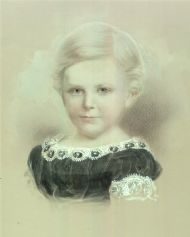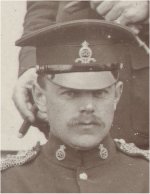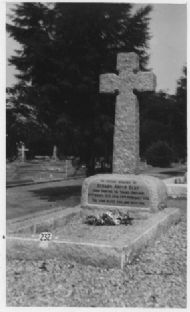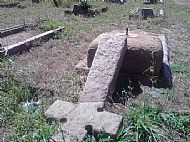A tribute to
Gerard (Arden) Clay
17.03.1871 - 23.02.1955
Capt. Clay, Staffordshire Yeomanry, 1900
Gerard was born on 17 March 1871 at Stapenhill House, Burton-on-Trent, the second son of Charles John Clay and Aggie (Agnes Lucy) née Arden. One of his Godfathers was the Rev. John Harden Clay, the son of his great uncle, the Rev. John Clay.
Gerard's elder brother was Arthur Joseph, born 19 April 1870, 11 months older.
Gerard's younger brother was Ernest Charles, born 2 December 1872, so 21 months younnger; and his youngest brother was Wilfrid Henry, born 13 February 1874, so 35 months younger.
All were born in the family home of Stapenhill House. Following the birth of Wilfrism their father came home from work to find the midwife dead drunk on the floor, and his wife bleeding to death; she died four days later.
Her four boys were aged 4, 3, 1 and brand new, so their mother's sister Margaret, five years older but not married, moved in to look after the boys. Four years later, on 11 May 1878, she was killed in a riding accident while out with the Hunt.
On 6 September 1883, five years after the death of the boys' aunt, their father, Charles John, married Elizabeth Teasdale Smith
1855–1941. They had two daughters, half-sisters to the four boys, but the elder one, Mildred, died aged 13; the younger one, Hilda, was born on 12 August 1887, so was 16 years younger that Gerard. But she was dearly loved.

Gerard went to Elstree Preparatory School, and then, like his elder brother Arthur a year ahead of him, he went to Harrow. He hated it, and vowed that if he had sons, they wouldn't go there (they both went to Lancing). His younger brother Ernest went to Marlborough, while his youngest brother Wilfrid reverted to family tradition by going to Repton.
Despite his dislike of the school, it instilled in him a love of poetry, and of Latin, and for many years he amused himself by writing poetry, and also translating Horace.
Gerard went on from Harrow to the Royal Agricultural College at Cirencester. He was very keen on soccer and rugby, and played for the College – upon his death, his photographs of that period were passed to the College, who were so kind as to provide copies.

Gerard in the RAC Football team
From 1892 to 1900 Gerard managed his father's Holly Bush estate at Newborough, Burton-on-Trent.
Gerard was a recognised expert and breeder of smooth-haired fox-terriers, and judged at the Fox Terrier Club at Crufts, and in Austria and the U.S.A.
In 1900 Gerard, as a 29-year-old Lieutenant, with five other officers and a hundred and thirty yeomen, volunteered for active service in South Africa in the Boer War. This contingent formed the 6th (Staffordshire) Company of the 4th Battalion Imperial Yeomanry, the Queen's Own Regiment of Rifles, under the command of Captain Bromley-Davenport.
Now 29, Gerard kept in his pocket a photograph of his beloved 14-year-old half sister Hilda.
Gerard was promoted Captain, and appointed to command a Company. He was wounded twice, and then invalided out with enteric fever. He was awarded the Queen's Medal with four clasps.
He kept a diary throughout his life, but the entries for this period are pretty dull, principally because he carried it with him, and there was always the chance of capture and it being read by the enemy. On his way back to England with the Staffs Yeomanry, Gerard wrote their "Official History".
Upon his return to England, Gerard joined Bass, Ratcliffe and Gretton, and went "through the Works" as training, before joining his father and elder brother on the Board of Directors. He remained a member of the Territorial Staffordshire Yeomanry.

In 1904 he agreed to be Godfather to a cousin, Gerard Leigh "Peter" Clay.
On 25 April 1906, five weeks after his 35th birthday, Gerard was married in Stretton, Burton‑on‑Trent to (Ella) Violet Thornewill, then aged 21.
They had two sons :-
Gervas (Charles Robert), born on 16 April 1907
Ralph (Arden), born on 18 April 1908
The family lived at Needwood Lodge, Rangemore , now "The Needwood Manor Hotle".
In 1914, when Gerard was 43, he became seriously ill, and, though he recovered, he was not passed fit for service in the First World War. Also, his three brothers (Arthur, Ernest and Wilfrid) told him that, as he had fought in the Boer War, he had done his duty, and they, all three, joined up. The eldest brother, Arthur Joseph Clay, died on 18 February, 1915 of illness, but "on Active Service".
Gerard was founder President of the Trade Marks, Patents and Designs Federation (TMPDF) in London, a position he retained for ten years. For part of his time with the Federation, he also represented Bass, Ratcliff & Gretton, Ltd., at their meetings. This company was famously interested in trade marks, having taken up an entire page of Trade Marks Journal No. 1 of 3rd May 1876 with four Marks, three of which are still on the register, including Trade Marks No. 1 and No. 2, and the Bass red triangle No. 914. So Gerard’s interest in establishing the Federation is easily explained.
Gerard became what would now be called Personnel Director of Bass, Ratcliff & Gretton, and he worked there every day. In the early days, he would ride down into Burton on horseback, and leave his horse in the stables vacated by the dray horses out at work. Later he went by car, although he frequently walked the five miles home. This he continued to do until 1926, when he retired at the age of 55, with a "golden handshake" following a Boardroom re-shuffle after the merger with Worthington, which he had opposed. He, as a very minor share-holder, was out-voted.
The family then moved south, to Weston House, Albury, in Surrey, leased from the Duke of Northumberland. He moved away from Burton partly because he felt that workers who had spent their lives with the Company, and knew him well, might appeal to him for redress, and he was now powerless to help them. By this time, his elder son was up at Oxford, and his younger son was undergoing engineering training in London.
He took up beagling, and became Secretary of the Guildford and Shere Beagles.
In 1937 he moved again, after selling his collection of antique silver to enable him to buy Abbotswood, Hurtmore, Godalming, Surrey, a large house in a hundred acres, where, during the Second World War he cleared some of the woods to grow potatoes - "Digging for Victory". Gerard's elder son was refused leave to enlist, and spent the War in the Colonial Administration in Northern Rhodesia. His younger son, by this time a qualified Electrical & Mechanical engineer, served throughout the War in the Royal Air Force. After the war, seeking employment, his brother suggested the copper mines in Northern Rhodesia, so thither he went, working for the Rhokana Corporation, first in Nkana, then Johannesburg, and finally Salisbury (now Harare).
After the War, with both sons settled in Northern Rhodesia, and a Socialist Government making it impossible for him to continue in his way of life, in 1948 he and Violet emigrated to join their sons, and built a house in Essex (now Pamo) Avenue, Kitwe, which they called "Arden".
Gerard was a "family historian". He was 5ft 8ins in height, of slight build, but of erect and military bearing. Always very fit and active, he did a great deal of walking. In his younger days he wrote poetry, and had a volume privately printed. He was also fond of translating Homer from the Greek.
Gerard died of a coronary thrombosis, on 23 February 1955 in Kitwe, Northern Rhodesia at the age of 83, and was buried in Nkana Cemetery, in the country now called Zambia.

Alas ! By 2018, the Cross on his grave had been toppled:-

- - - - o o o O o o o - - -
WebSite created 25th August, 2009






